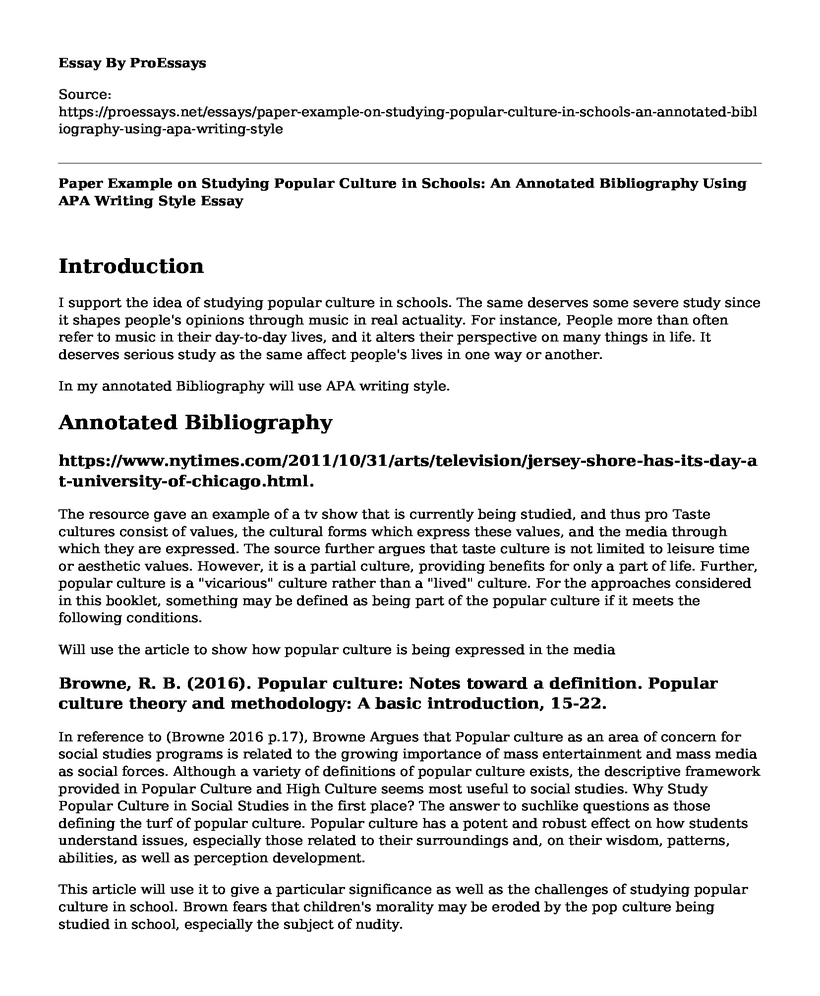Introduction
I support the idea of studying popular culture in schools. The same deserves some severe study since it shapes people's opinions through music in real actuality. For instance, People more than often refer to music in their day-to-day lives, and it alters their perspective on many things in life. It deserves serious study as the same affect people's lives in one way or another.
In my annotated Bibliography will use APA writing style.
Annotated Bibliography
https://www.nytimes.com/2011/10/31/arts/television/jersey-shore-has-its-day-at-university-of-chicago.html.
The resource gave an example of a tv show that is currently being studied, and thus pro Taste cultures consist of values, the cultural forms which express these values, and the media through which they are expressed. The source further argues that taste culture is not limited to leisure time or aesthetic values. However, it is a partial culture, providing benefits for only a part of life. Further, popular culture is a "vicarious" culture rather than a "lived" culture. For the approaches considered in this booklet, something may be defined as being part of the popular culture if it meets the following conditions.
Will use the article to show how popular culture is being expressed in the media
Browne, R. B. (2016). Popular culture: Notes toward a definition. Popular culture theory and methodology: A basic introduction, 15-22.
In reference to (Browne 2016 p.17), Browne Argues that Popular culture as an area of concern for social studies programs is related to the growing importance of mass entertainment and mass media as social forces. Although a variety of definitions of popular culture exists, the descriptive framework provided in Popular Culture and High Culture seems most useful to social studies. Why Study Popular Culture in Social Studies in the first place? The answer to suchlike questions as those defining the turf of popular culture. Popular culture has a potent and robust effect on how students understand issues, especially those related to their surroundings and, on their wisdom, patterns, abilities, as well as perception development.
This article will use it to give a particular significance as well as the challenges of studying popular culture in school. Brown fears that children's morality may be eroded by the pop culture being studied in school, especially the subject of nudity.
Turner, T. N. (2019). Using Popular Culture in Social Studies. How to Do It Series, 2, No. 9.
The article by Turner gives insight into the significance of studying pop culture mainly in high school as a social study subject (Turner 2019 p.9). The book further outlines the advantages that come about with the study of the same Turner argues that Social studies curricula have given increasing devotion to the contemporary modern-day world and to factors deemed pertinent to everyday life. The study of popular culture seems particularly appropriate and essential, not just because of its presence, but for several vital curricular reasons, encompassing the following; the popular culture is intimately connected to the individual's personal and social development, related to individual habits, own self-perception and values, emotional needs, ambitions, and dreams. The popular culture is the student's culture, his or her "field" that surrounds and impacts on the student, and which the schoolgirl/boy most dreadfully seeks to comprehend.
The Article by Turner is essential and applicable in this essay on the basis that it shows that students at all levels possess an intimate and detailed knowledge of the popular culture
Conclusion
The resources and materials for studying the popular culture are abundant, easily accessible, and often inexpensive or free, and often already part of students' everyday lives. The study of popular culture takes advantage of existing student interest and curiosity. Therefore, the teacher does not need to create student interest, concern, or involvement; hut can concentrate on maintaining that level of exciting engagement, which already exists.
The popular culture has lasting social importance and significance. The elements within the popular culture of any time nr group contribute to the total pattern of any religion. Popular culture reflects society's values or those of the group. The study of the elements in a student's own popular culture can be a key to the recognition and understanding of principles of social antiquity, ethnic anthropology, and sociology in other cultures.
Bibliography
Turner, T. N. (2019). Using Popular Culture in Social Studies. How to Do It Series, Series 2, No. 9. Retrieved from https://eric.ed.gov/?id=ED178421
Jersey Shore' Arrives in Academia. Discuss https://www.nytimes.com/2011/10/31/arts/television/jersey-shore-has-its-day-at-university-of-chicago.html
Browne, R. B. (2016). Popular culture: Notes toward a definition. Popular culture theory and methodology: A basic introduction, 15-22. Retrieved from https://www.researchgate.net/publication/309166427_Caribbean_Popular_Culture_Everyday_Lives_Racial_Politics_and_Transnational_Movements
Cite this page
Paper Example on Studying Popular Culture in Schools: An Annotated Bibliography Using APA Writing Style. (2023, Apr 09). Retrieved from https://proessays.net/essays/paper-example-on-studying-popular-culture-in-schools-an-annotated-bibliography-using-apa-writing-style
If you are the original author of this essay and no longer wish to have it published on the ProEssays website, please click below to request its removal:
- One Thing I'm Afraid to Lose Essay
- Essay on English as a Medium of Instruction
- Text Mining and Text Analytics Paper Example
- The Grieving India Essay Example
- Essay Example on Latino Students: Changing Lives Through Agency Efforts
- Essay Sample on Parent Involvement in Education: Improving School Outcomes
- Paper Example on My Heritage, My Pride: Crafting an Identity From a Faded Culture







